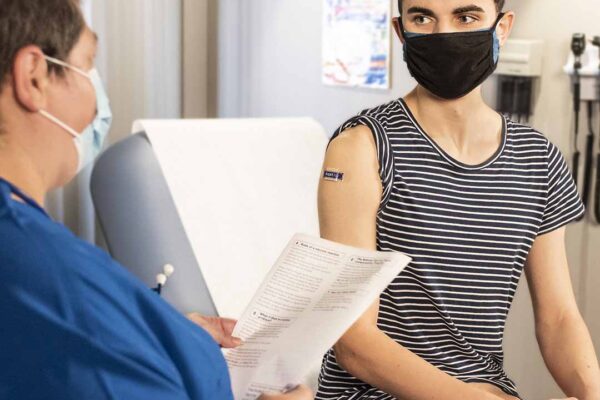In the seven years since the Supreme Court confirmed in Obergefell v. Hodges that same-sex couples have the right to marry, the LGBTQ+ liberation movement has both celebrated monumental successes and faced aggressive, ongoing attacks. In more recent years, there has been a marked increase in anti-LGBTQ+ sentiment across the country—and within our state of Kansas.
The number of anti-LGBTQ+ hate groups in the United States has ballooned from 45 pre-Obergefell to 65 as of 2021.[1] And Kansas has seen consistent legislative attacks on LGBTQ+ people, fostering a hostile social climate for LGBTQ+ Kansans across the state.[2]
While some are quick to brush off LGBTQ+ issues as a problem for populated cities in coastal states, this is not the case—55% of the United States’ adult LGBTQ+ population lives in the Midwest or South, and an estimated 92,000 LGBTQ+ people live in Kansas.[3] Issues impacting the LGBTQ+ community impact our Kansas community as a whole, and we must not ignore that fact. Additionally, a significant number of LGBTQ+ Kansans live in rural counties and are more likely to experience discrimination, community resentment, and a lack of access to support structures.[4]
In fact, LGBTQ+ Kansans are facing troubling amounts of discrimination across multiple areas of their lives. Nearly one-third of transgender Kansans report being fired, denied a promotion, or not hired because of their gender identity or expression.[5] And 23% of LGBTQ+ Kansans report they have been discriminated against at a restaurant, hotel, or other business because of their sexual orientation or gender identity.[6]
This discrimination has harmful lasting impacts in LGBTQ+ Kansans lives—making LGBTQ+ Kansans twice as likely to be unemployed as their non-LGBTQ+ counterparts and nearly three times as likely to not have money for food.[7] One-third of transgender Kansans report experiencing homelessness, and more than one-third report living in poverty.[8] Anti-LGBTQ+ discrimination can also lead to worse mental and physical health outcomes for LGBTQ+ people in the state.[9]
Though this may seem like a bleak picture I’m painting of LGBTQ+ Kansans’ experiences, it’s important that we remember it does not have to be this way. In fact, most Kansans want to protect LGBTQ+ people—67% of Kansans support LGBTQ+ non-discrimination protections.[10]
This fact doesn’t surprise me. As a lifelong Kansan, I’m very familiar with our state’s sense of community and generosity. But as an openly queer and transgender person, I’m also familiar with the challenges LGBTQ+ people face living here.
That is why I will be spending the next two years with the ACLU of Kansas as a Legal Fellow focused on enforcing, strengthening, and expanding LGBTQ+ Kansans’ legal protections. I will be solely dedicated to advocating for LGBTQ+ Kansans rights.
This fellowship builds on my longstanding recognition of the need to build community and stand up for the rights of LGBTQ+ people in this state. I have been advocating for LGBTQ+ Kansans since my undergraduate career at Newman University, and I continued that advocacy during my law school career at the University of Kansas. Over the years, I have met many dedicated LGBTQ+ advocates and countless LGBTQ+ Kansans and allies from across the state.
My experiences have made it clear that most Kansans want to improve the lives of LGBTQ+ people in our state—but my years in this space and my own lived experience have also highlighted the lack of resources and support that exist toward that end. Currently, there is no organization in Kansas solely dedicated to enforcing and protecting LGBTQ+ Kansans’ rights through litigation, legal advocacy, and public education. And with the rise of anti-LGBTQ+ sentiment across the country and in the Kansas statehouse, it is more important than ever that LGBTQ+ Kansans have someone in their corner.
While I am honored to be able to step into this role, I know that LGBTQ+ Kansans cannot reach liberation through my work alone. That will take community power, political engagement, and a commitment to acting with love. I am thrilled to begin this work for our state, and eager to connect with other Kansans who want to do the same.
To learn more or get involved with D.C.’s work in Kansas, please contact them at [email protected].
[1] https://www.splcenter.org/fighting-hate/intelligence-report/2015/active-hate-groups-united-states-2014; https://www.splcenter.org/sites/default/files/splc-2021-year-in-hate-extremism-report.pdf
[2] See, e.g., https://kansasreflector.com/2022/04/25/anti-trans-legislation-in-kansas-hurts-lgbtq-youths-but-we-can-all-do-something-about-it/
Related Issues
Stay Informed
Sign up to be the first to hear about how to take action.
By completing this form, I agree to receive occasional emails per the terms of the ACLU’s privacy statement.
By completing this form, I agree to receive occasional emails per the terms of the ACLU’s privacy statement.



